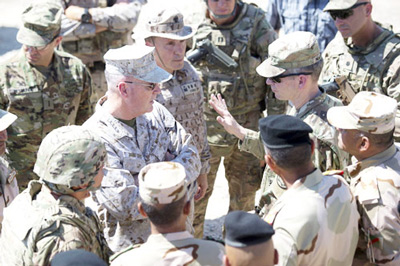
Vol. 80/No. 21 May 30, 2016
(lead article)
US gov’t seeks stability for imperialist order in Mideast
Tries for Moscow deal while sending more troops

Obama drew down Washington’s troop deployments in Iraq and Afghanistan from 200,000 when he succeeded George W. Bush to nearly 5,000 in Iraq and 9,800 in Afghanistan today. But his administration is increasing the U.S. combat presence in those countries, as well as in Syria, and has authorized airstrikes and covert operations in Libya, Pakistan, Somalia and Yemen.
Washington just inaugurated its first European ground-based anti-missile system in Romania. And the Obama administration has stepped up naval operations in the South China Sea to defend its interests against Beijing, including stationing warplanes in the Philippines under a new agreement with Manila.
In an announcement pointing to a bigger military presence in Libya, where recent U.S. airstrikes have targeted Islamic State, Pentagon officials acknowledged that Special Operations soldiers have been stationed at two outposts there since late last year. Their task is to “identify potential allies among local armed factions and gather intelligence on threats,” the Washington Post reported May 12.
While Obama often says he favors drone strikes and the use of “Special Ops” over “boots on the ground,” Washington’s growing presence in Iraq and Syria is resulting in deaths and injuries in combat, which the administration tries to cover up or play down.
Special Warfare Operator 1st Class Charles Keating IV was killed by Islamic State forces near Mosul, Iraq, May 3. U.S. Marine Staff Sgt. Louis Cardin was killed by IS March 19 in northern Iraq, and eight of his fellow Marines were wounded. And Special Forces Master Sgt. Joshua Wheeler was killed there last October.
White House Press Secretary Josh Earnest, in a classic example of doublespeak, said Keating was not on a “combat mission” but “was in a combat situation.”
“It’s a Combat Mission, Mr. President,” was the title of a May 5 Military Times editorial condemning “the sort of condescending semantics Washington plays to deny the obvious.”
U.S. imperialism is increasing its military footprint in Libya as Islamic State, which is losing ground in Syria and Iraq, has deployed troops there and captured territory. The reactionary group’s advances are only possible because of the absence of a central government and fracturing of the country into warring factions’ after Washington and its allies unleashed widespread airstrikes on the country that aided the overthrow of the regime of Moammar Gadhafi in 2011.
Social catastrophe in Syria
At the same time Washington increases its troop presence in Syria, it is collaborating with Moscow in an effort to reach a truce and protect its economic and political interests in the region.The partial cease-fire currently in place threatens to come apart as competing ruling classes from Saudi Arabia to Turkey and Iran to Israel all maneuver for their own interests.
The social catastrophe working people face keeps getting worse.
Syrian dictator Bashar al-Assad, who launched a brutal war five years ago seeking to put down mass demonstrations against his rule, is losing support from his base in the western part of the country as cumulative effects of that war cripple the economy.
Rampant inflation is hammering working people. The exchange rate for the Syrian pound has gone from 47 to the dollar in 2011 to 620 per dollar May 10.
Assad has relied on support from the 2.7 million workers in the bloated state sector, more than 10 percent of the pre-war population. Their wages have dropped to $20-$30 a month. More than 80 percent of Syrians live below poverty level.
A Damascus teacher spends her monthly pay right away, a May 11 Financial Times article reported. “Prices are changing every hour, not every day or month,” she said. Traders close to Assad “may be speeding up the currency’s deterioration by converting their profits back into dollars and moving them abroad,” the article added.
Angry over high prices and the traders’ actions, Syrians in areas under government control planned a three-day boycott of non-essential goods in mid-May.
Syria’s foreign reserves have fallen from $20 billion before the war to $700 million, the World Bank reports, and its gross domestic product has been dropping by more than 15 percent a year. The Islamic State takeover of Syria’s eastern oilfields in 2014 cut export revenues from $4.7 billion to below $200 million.
Despite an air and ground assault, Iranian forces, Hezbollah troops and Assad loyalists have been unable to recapture Aleppo in northern Syria, formerly the country’s largest city and a stronghold of opposition forces from Islamist groups to the Kurdish People’s Protection Units, which are also battling each other.
In an apparent act of revenge over the Syrian government attacks on Aleppo, the Islamist groups Ahrar al-Sham and al-Qaeda affiliate Nusra Front killed at least 19 civilians May 12, including women and children, in the mostly Alawite Muslim village of al-Zara. The dead are thought to be family members of troops loyal to Assad, whose base is heavily Alawite.
Related articles:
Washington launches anti-missile system on Russian ‘periphery’
Front page (for this issue) | Home | Text-version home